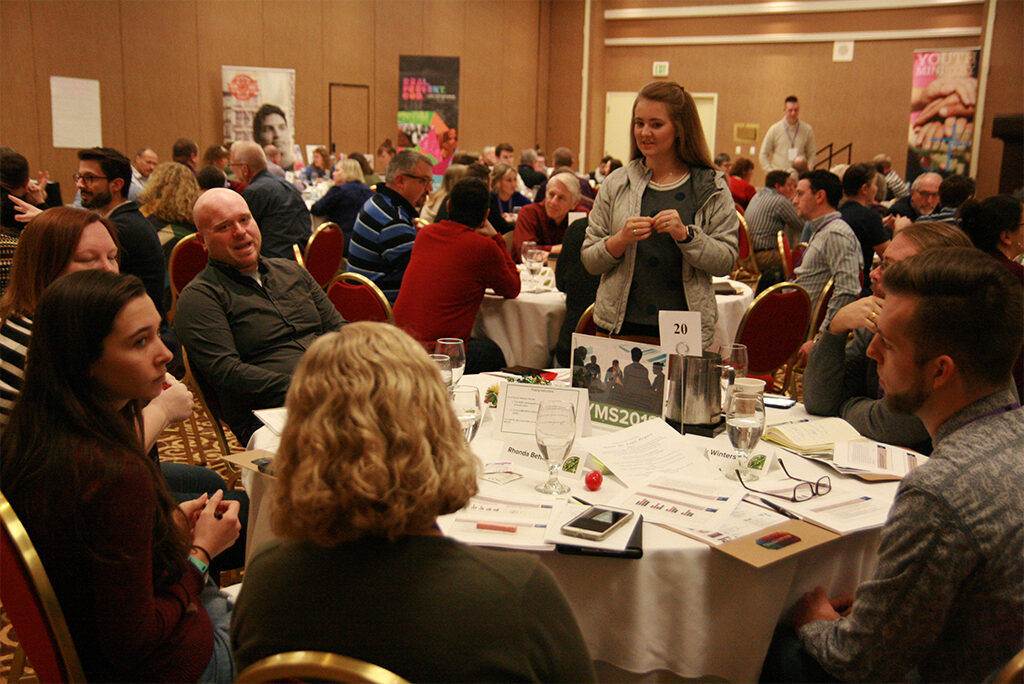By Cheryl Magness
The LCMS Youth Ministry Symposium — held Jan. 28–30 in St. Louis — was all about ministry to young adults, with a particular emphasis this year on recent research concerning millennials in the Church.
The research — conducted by LCMS Youth Ministry and overseen by Ryan Curnutt, LCMS senior research analyst — focused on the question of retention of LCMS youth following confirmation. It was prompted in part by a 2016 poll of Young Adult Volunteers at the LCMS Youth Gathering. The first-of-its-kind poll was a modified version of one that has been administered to Gathering participants since 1980.
Julianna Shults, program manager of the LCMS Young Adult Corps, says that the 2016 survey of Gathering volunteers was revealing, but “raised even more questions” about today’s young adults — questions Youth Ministry wanted to pursue. To that end, a research team created and administered two surveys.
Survey of congregations
In the first, a random sampling of 1,800 LCMS congregations were invited to respond to an online questionnaire regarding those who were confirmed in their parish during the years 2004–06. There was a 10 percent response rate, with 184 congregations answering the survey, resulting in a 6 percent margin of error.
The research team encouraged those at the Symposium to review and be diligent about record-keeping procedures, noting that nearly one-fourth (23 percent) of congregations responding to the survey did not have usable confirmation records.
Assuming a typical confirmation age of 12–14 — the majority of those studied were confirmed in seventh grade — the subjects of the survey would likely be around 23–27 years old.
Survey respondents — usually the pastor but sometimes another person, particularly if the current pastor wasn’t on staff during the years being studied — were asked to review their confirmation records and provide information to the extent possible about the target population.
Research findings included the following statistics regarding the current church attendance behavior of 2004–06 confirmands in the churches surveyed:
- 18 percent are still regularly attending the church in which they were confirmed;
- 10 percent have moved away but are still LCMS;
- 3 percent attend a different LCMS church near the one in which they were confirmed;
- 15 percent “occasionally” attend their home church;
- 11 percent attend a church in another denomination;
- 11 percent are no longer attending any church; and
- 30 percent are of unknown status regarding worship practice.
The numbers equate to roughly 1-in-3 confirmands still attending an LCMS church, a statistic in line with a 2014 Pew Religious Landscape Survey that revealed a similar retention rate for millennials raised in the LCMS.
The Pew study also suggested that retention of millennials is equal to or even slightly higher than that of other generations. This may seem surprising considering the current widespread concern about millennial under-representation in the Church today, but that fact is due more to their never having been in church at all than to poor retention.
Factors that were identified in the LCMS study as positively influencing retention included:
- having adults on staff who work with youth (not necessarily paid);
- having a Lutheran school;
- having the same pastor over a long time; and
- involving young people in church leadership.
It was also noted from the research that larger, suburban congregations seem to retain youth at higher rates than rural and small-town churches, but rural and small-town churches are more likely to remain connected with their young people in that they know where the youth are.
Some factors that seem to have little or no impact on retention are:
- the age of the senior/sole pastor;
- having a large proportion of young adults in worship; and
- the presence of a local college or university.
The volume of information that was presented at the Symposium was such that it would be easy to get lost in simply reporting numbers. But perhaps more helpful is to report a larger takeaway, which was the emphasis on relationships, especially of parents, as opposed to programs.
Presenter Dr. Dave Rueter, director of the Director of Christian Education program at Concordia University, Irvine, Calif., and author of the book Teaching the Faith at Home, said in one of his presentations responding to the data, “Parents are the single greatest influence on the future faith lives of children and youth. Emblaze this on your mind. … How we empower and … equip parents to take an active role in the faith lives of their children is critically important.”
Survey of young adults
Curnutt echoed that sentiment as he presented results of the second survey, completed by the research team in 2017, of over 2,000 young adults ages 18–35 (average age 24) that have at some point in their lives had a connection to the LCMS.
When asked who has had the greatest influence on them spiritually, they responded as follows:
- 29 percent – parents;
- 13 percent – pastor of home church;
- 12 percent – other family members;
- 12 percent – teacher;
- 11 percent – another pastor; and
- 10 percent – youth minister.
The majority of respondents in the Young Adult survey (around 1,400) are still active members of LCMS congregations.
Commonly reported factors in this group were:
- parents who actively practice the faith;
- healthy relationships in which they were comfortable talking with parents about faith and doubts;
- a pastor who showed personal care for them;
- attendance at an LCMS Gathering and/or Lutheran camps;
- remaining geographically close to their home church; and
- involvement in LCMS campus ministry (either a Concordia or another LCMS congregation or campus ministry) during college.
Of those surveyed who no longer identify as LCMS (around 375), the following were given as reasons for leaving the LCMS:
- lack of care for them by their church at a time of crisis;
- feeling that the LCMS is exclusionary, unwelcoming or dismissive, including to them personally;
- disagreeing with the LCMS on social issues;
- lack of support/opportunities for them to get involved;
- preferring a different kind of worship; and
- finding people in the LCMS to be “inauthentic.”
The research team presented a number of quotes from the “no longer LCMS” group, noting that the inclusion of unbiblical views in some of the quotes was not meant to suggest that the Church needs to change to accommodate those who have left but to emphasize the importance of “careful listening so that church leaders and ministers are equipped to defend doctrine while compassionately engaging … this diverse generation.”
The research team also noted that while there is a widespread belief that people tend to drift away from the Church when they are young adults, intending to return when they start their own families, there was only one comment among all respondents that reflected such a view.

‘Hard numbers’
In attendance at the Symposium were a mixture of representatives from over 25 LCMS districts, the Concordia University System, LCMSU, pastors, lay leaders, DCEs and young adults.
The Rev. Jay Winters, pastor at University Lutheran Church & Student Center in Tallahassee, Fla., found the Symposium to be “helpful in giving me, as a campus minister, the opportunity to show hard numbers about the realities we have been seeing on campus for quite some time. It is helpful to be able to show the importance of a home church’s impact on a student before they ever arrive at college. I have even joked at times that the best thing that I could do for campus ministry would be to take a call to a middle school context because that is where we seem to be losing our students well before they arrive at college.”
Winters noted that “the responsibility for catechesis and discipleship … isn’t something that we can leave” in any single set of hands, whether at a student’s home, campus or future church. “It takes all of us serving that student together to show that we are truly a Synod that prioritizes ‘life together’ along with witness and mercy.”
Asked what he would like to see come out of the findings of the 2016 retention study and the 2017 Young Adult survey, LCMS Director of Youth Ministry Rev. Mark Kiessling said, “We hope the opportunity to listen to many young adults will strengthen and encourage congregations, schools and church workers in their support of Christian parents and Christian education. We hope to add resources which encourage this work to support young people in their walk with Jesus.”
Dr. Kevin Borchers, assistant professor of Christian Education at Concordia University Chicago, River Forest, Ill., may have effectively summed up the predominant message of the 2018 Youth Ministry Symposium when he said, “Young people don’t want more to do. They want safety, authenticity and the sacred.”
LCMS Youth Ministry is planning a series of webinars to present and further discuss the data outlined above. For more information, see the Youth Ministry Facebook page.
Cheryl Magness (cheryl.magness@lcms.org) is managing editor of Reporter Online and staff writer for LCMS Communications.
Posted Feb. 19, 2018
